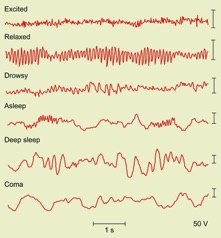The Science of Consciousness:
Chapter 12: Sleep
What this chapter is about: what is sleep?
What is sleep, why do we sleep, and what happens when we don't? How does the brain govern the sleep-wake cycle?
Additional information
Sleep disorders - Insomnia. The most common sleep disorder is almost certainly insomnia, trouble in getting to sleep, maintaining sleep, or waking too early. I am often asked what people can do about it. We all have restless nights occasionally, and although annoying, leaving us tired, and in need of catching up, they are nothing to worry about. However regularl problems with maintaing sleep are distressing and can have serious effects on mental and physical health. (One of the themes of this book is how closely related these two are.)
Sleep hygiene. I am lucky in rarely having touble sleeping, but even I avoid caffeine after 6 pm, and try to avoid MSG (even if it is a placebo effect). I go to bed and sleep at the same time every night, wake up at the same time every day (inlcuding weekends and Christmas), and don't have a television in the bedoom. I set my iPad to a nice warm night colour, and avoid anything too stimulating. If I had trouble sleeping I would avoid my phone and laptop altogether. You might try avoiding eating too late.
From the shelf and over-the-counter medication. Melatonin might help you; I took it in the good old days when we could go anywhere for reducing jet lag. It isn't widely avaliable in the UK, but you can get it online (and just from the shelf in the USA). It is available on prescription. I'm not sure why it's not widely available because over-the-counter alternatives include first-generation antihistamines such as chlorpheniramine and diphenydramine, and these have been associated with with an increased risk of cognitive impairment in older individuals. It should be said that these are largely correlational studies and as yet the association is far from definite. When I have time I will add some references but they're easily found in a search engine.
Prescription only. There are now several drugs available that facilitate sleep. They're much safer than the older barbituates, although the widely prescribed benzodiazepines are not recommended for any period of time because they can be addictive.
Long-term treatment. If you have persistent insomnia you need to find out why. Is there an underlying health condition? If so, insist on investigation in addition to medication. Is there something about your lifestyle that hinders sleep? Are you getting enough exercise? Are you sleeping too much? Are you having a long afternoon nap? Remember that there is a wide variation in how much sleep people need.
In the news
Sleepwalking man cleared of sexually assaulting woman. "A man with a history of sleepwalking has been found not guilty by reason of insanity of sexually assaulting his friend's girlfriend."
Additional information
Sleep spindles originate in the thalamus.
Additional glossary items
Monophasic sleep. When an animal sleeps once a day, as most humans do.
Biphasic sleep. Spreading sleep across two phases a day. That's what I do.
Polyphasic sleep. Spreading sleep across many phases across 24 hours. That's what Beau does.
Some people argue that we are better suited to polyphasic sleep, but the evidence is unclear. An internet search will throw up many references, but see for example:
This article in Time magazine.
Polyphasic sleep might be bad for you, concludes this review:
Weaver, M. D., Sletten, T. L., Foster, R. G., Gozal, D., Klerman, E. B., Rajaratnam, S. M. W., Roenneberg, T., Takahashi, J. S., Turek, F. W., Vitiello, M. V., Young, M. W., & Czeisler, C. A. (2021). Adverse impact of polyphasic sleep patterns in humans: Report of the National Sleep Foundation sleep timing and variability consensus panel. Sleep Health, 7(3), 293–302. https://doi.org/10.1016/j.sleh.2021.02.009
Correction
Not really a correction, but I now think that Figure 12.9 on p. 295 depicting Hobson's AIM model of consciousness is a bit difficult to understand. It's hard depiciting three dimnesional graphs in 2D and I would probably redo it for a new edition. Please pay attention to the text that follows for a description. To clarify,quoting Hobson (2009),
"NREM sleep is positioned in the centre of the space because it is intermediate in all quantitative respects between waking and REM sleep."
The original paper is:
Hobson, J. (2009). REM sleep and dreaming: Towards a theory of protoconsciousness. Nature Reviews Neuroscience, 10(11), 803–813. https://doi.org/10.1038/nrn2716
Additional information
In any new addition I would add more about sleep transition and the hypnagogic state.
There is an interesting paper by Lacaux et al. (2024) on sleep onset.
I would also discuss the work of Mavromatis:
Mavromatis, A. (1991). Hypnagogia: the unique state of consciousness between wakefulness and sleep. London: Routledge.
I think the Wikepedia article on hypnagogia is a good introduction.
The Japanese term for sleep paralysis, when REM sleep and waking overlap, is kanashibari.
See:
https://yokai.com/kanashibari/
https://www.japanpowered.com/japan-culture/chasing-nightmares-kanashibari
Additional review questions
1. Would a conscious robot need to sleep?
2. Can you catch yourself at the moment of falling asleep? If not, why not?
3. How does the content of your hypnagogic states differ from the content of your late night dreams?

